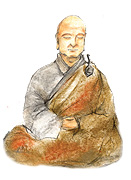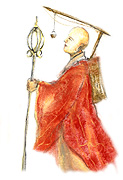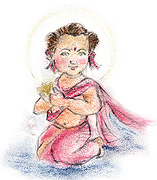| |
| ◎
The
Disciples of the Buddha│1│2│ |
|
 |
Master Jianzhen,
transmitter of the Dharma to Japan. |
◎The
First Monastic Transmitter of the Vinaya to Japan
During the Tang Dynasty in China, Japanese
monks Eiei and Fusho came to China to study Buddhism. After seeing how
the Vinaya (monastic regulations) had spread so prosperously in China,
they set out looking for an eminent master who is willing to cross the
ocean to introduce the Vinaya to Japanese Buddhism. After ten years of
intense search, they finally found Master Jianzhen, who was well-versed
in the studies of the Vinaya, to go to Japan for the sake of transmitting
the Buddha's teachings.
In his effort to reach Japan to transmit the Dharma, Master Jianzhen
was frustrated for five times by storms and pirates. He was finally successful
on his sixth attempt to cross the sea. In all, the master spent eleven
years trying and lost his eyesight in one of the accidents. However, he
was never discouraged. When he reached Japan, Master Jianzhen transmitted
the Vinaya extensively and became the founding patriarch of Japan's Vinaya
School (Risshu). Moreover, the Chinese culture that was introduced by
Master Jianzhen still has a lasting effect on the life and customs of
the Japanese people, and the Master is revered by the Japanese people
as “the Father of the Japanese Culture.” Therefore, as long as we can
stay firm in our resolve, there is nothing that we cannot accomplish.
 |
| Master Xuanzhuang, who made the journey
West in search of the Dharma. |
◎Master
Xuanzhuang's Journey to the West in Search of the Dharma
Master Xuanzhuang is the most famous Chinese Buddhist. He is well known
for his unwavering determination to go to the West in search of Buddhist
sutras.
After becoming a monk at age eleven, Master Xuanzhuang became well-versed
in the Buddhist sutras and commentaries that were translated into Chinese.
However, he found many discrepancies in the teachings amongst the different
versions of translation. Therefore, he decided to travel to the West in
search for the correct Dharma.
In his journey, Master Xuanzhuang risked his life crossing dangerous
deserts and conquering snow-capped mountains in distant land. He even
vowed, “Rather take a step forward to the West (or India) and die, but
never a step backward to the East (or China) and live.” Finally, he arrived
in India and studied the sutras and sastras at Nalanda University, the
most superior institute in Buddhist studies, for seventeen years. After
his return to China, Master Xuanzhuang began to extensively translate
sutras, numbering more than a thousand scrolls, to become the most outstanding
translator in the history of Chinese Buddhism. He was also known as one
of the most courageous explorers in Chinese history. Because of his vast
knowledge and insight in the studies of Buddhist sutras, Vinaya and commentaries,
he was given the title “Tripitaka Master Xuanzhuang.”
 |
Hanshan and Shide,
who understood the importance of respect and tolerance. |
◎What
Should I Do When Others Call Me Names?
During the Tang Dynasty, there were two monks, Hanshan and Shide, who
were friends with each other. While Hanshan came from a very poor family,
Shide was a server at Guoqing Temple's dining hall on Mt. Tiantai in Zhejiang
province.
One day, Hanshan asked Shide, “What should I do if people were to humiliate
me, abuse me, despise me, and deceive me?” Shide answered, “There is nothing
that you can do except to avoid them, to tolerate them, to respect them,
and to ignore them. Then several years later, you go see them again.”
Therefore, it is clear that forbearance is wisdom, strength, loving-kindness,
and compassion. It is through forbearance that one can transform hate
and anger into peace and harmony.
 |
| Sudhana in search of a good and virtuous teacher. |
◎Who
Are My Good Teachers?
Sudhana of India went everywhere in search of a good teacher who could
provide him with the absolute truth of life, and rid any doubt that he
might have.
On his journey, Sudhana first encountered Manjusri Bodhisattva and then
consulted, one by one, with a bhiksu, a bhiksuni, an elder, a ship's captain,
the female and male attendants of the Bodhisattvas and so forth. It was
not until his visit with Samantabhadra Bodhisattva that Sudhana realized
his wisdom. In the end, Sudhana had passed through 110 cities and towns
to study with fifty-three teachers who are good and virtuous in leading
him to the right path. His pilgrimage is also known as the fifty-three
visitations of Sudhana. Therefore, if we can learn something positive
from the people whom we meet everyday, they are our teachers.
 |
| Milarepa carried the stones for building houses on
his back. |
◎How
Should We Repent and Correct Our Mistakes?
Milarepa was a highly revered Tibetan
monk. At the tender age of seven, Milarepa lost his father. Soon after,
his paternal aunt and uncle robbed him of his wealth and home. In order
to take revenge, he studied black magic and eventually murdered a great
number of people.
Later, he was overcome with remorse and went to Marpa
to learn the correct practice. His teacher was very strict with him. In
order to purify Milarepa's negative karma, Marpa made him undergo many
hardships such as moving rocks and building houses, and after houses were
built, he made him tear them down, again and again, without a break. Although
his back was full of abscesses, Milarepa harbored no ill will toward his
teacher. He was even more diligent than before in his practice and continued
to make amends for his past misdeeds. Finally, he won the approval of
his teacher, Marpa. Therefore, as long as we are sincere in our remorse
and effort to turn over a new leaf, success is well within our reach.
◎How
Can We Become the Buddha's Disciples?
After reading the stories
on the Buddha's ten disciples, would you like to become a practicing Buddhist?
The Buddha once told his disciples, “From now on, all you have to do to
become a Buddhist is to practice the teachings that I have taught you
and actualize them in your everyday life.” The Buddha's teachings are
thus transmitted from generation to generation by his disciples.
What then did the Buddha actually teach? Simply put, it is to know how
to help others by doing good deeds, speaking kind words, and having good
thoughts at all times. If you could abide by the “Three Wholesome Acts
of Body, Speech and Mind” and carry them out, then you are a Buddhist,
a disciple of the Buddha.
|
|











